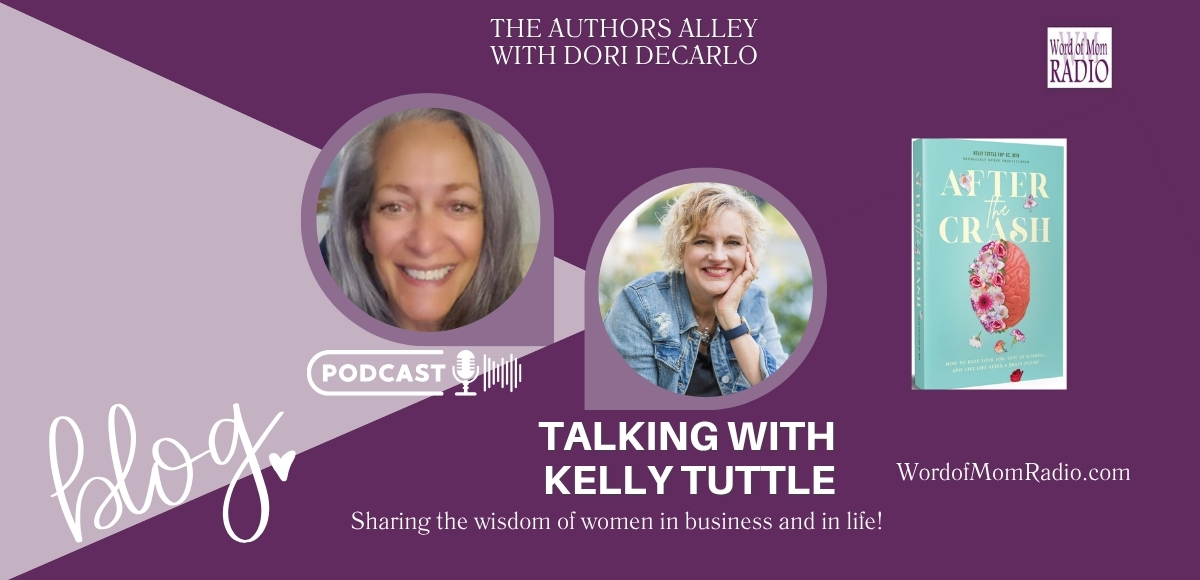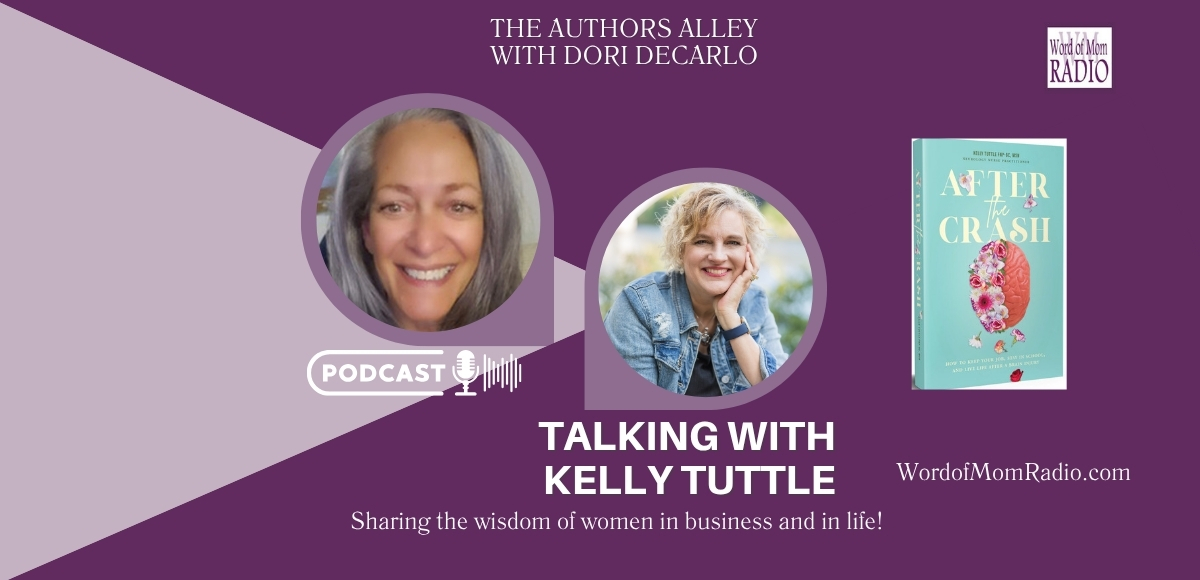Life After a TBI: Kelly Tuttle's Journey of Self-Discovery

In this blog post, we delve into the inspiring journey of Kelly Tuttle after she experienced a traumatic brain injury (TBI) in 2015. Kelly's story is one of resilience, self-discovery, and a profound commitment to helping others navigate the challenges of living with a TBI. She has transformed her personal experience into a powerful platform for advocacy and support. Her journey from struggling with the aftermath of her accident to becoming a neurology nurse practitioner who understands her patients on a deeply personal level is truly remarkable.
Here we expand on the insights shared in the recent podcast featuring Kelly. In the episode, Kelly shares her personal journey and discusses her book "After the Crash", which offers hope and practical advice for TBI survivors. If you haven't already, be sure to listen to the full episode Kelly Tuttle on The Authors Alley with Dori DeCarlo to gain a deeper understanding of Kelly's experiences and insights.
Kelly Tuttle's Journey After TBI
Kelly's life took an unexpected turn in 2015 when she was involved in a car accident that resulted in a traumatic brain injury (TBI). This event marked the beginning of a challenging journey filled with physical, emotional, and cognitive hurdles. However, it also became a catalyst for profound self-discovery and a renewed sense of purpose.
The Life-Altering Car Accident
The night of the accident is a blur. Kelly was driving when another car pulled out in front of her. The impact was severe, but in the immediate aftermath, she didn't fully grasp the extent of her injuries. Like many TBI survivors, the initial focus was on the visible physical wounds, while the invisible wounds to her brain remained largely undetected. This is a common experience for many TBI survivors, as the symptoms can be subtle and easily dismissed, leading to delayed diagnosis and treatment.
Realizing the Severity: Three Months Later
It wasn't until three months after the accident that Kelly realized something was seriously wrong. She experienced a range of debilitating symptoms, including severe headaches, dizziness, memory problems, difficulty concentrating, and overwhelming fatigue. These symptoms made it difficult to perform everyday tasks and significantly impacted her quality of life. Kelly's experience highlights the importance of recognizing the delayed onset of TBI symptoms and seeking prompt medical attention.
Navigating Life with a TBI: Challenges and Coping Strategies
Living with a TBI presents numerous challenges that can affect every aspect of a person's life. Kelly faced significant obstacles in her personal and professional life, including difficulty with cognitive tasks, emotional regulation, and social interactions. Despite these challenges, she demonstrated incredible resilience and determination to overcome adversity.
Kelly developed various coping strategies to manage her symptoms and improve her quality of life. These strategies included:
- Cognitive Rehabilitation: Engaging in exercises and therapies to improve memory, attention, and executive functioning.
- Physical Therapy: Addressing physical limitations and improving balance, coordination, and strength.
- Occupational Therapy: Learning adaptive techniques to perform daily tasks more effectively.
- Mindfulness and Meditation: Practicing mindfulness and meditation to reduce stress, improve focus, and enhance emotional regulation.
- Support Groups: Connecting with other TBI survivors to share experiences, gain support, and learn from each other.
Kelly emphasizes the importance of self-compassion and patience in the recovery process. She encourages TBI survivors to be kind to themselves and to celebrate small victories along the way. She notes the importance of finding support from medical professionals, therapists, and loved ones. This support network can provide encouragement, guidance, and practical assistance in navigating the complexities of life with a TBI.
Kelly's Role as a Neurology Nurse Practitioner
Before her accident, Kelly was already a neurology nurse practitioner. However, her experience with TBI gave her a unique perspective and deeper empathy for her patients. She now approaches her work with a profound understanding of the challenges and frustrations faced by individuals living with brain injuries. She uses her personal experiences to connect with her patients on a deeper level and provide them with compassionate, patient-centered care.
Sharing Hope and Tools with Other TBI Patients
Kelly is passionate about sharing her knowledge and experiences with other TBI patients. She strives to provide them with practical tools and strategies to manage their symptoms, improve their quality of life, and regain a sense of hope. She encourages her patients to actively participate in their recovery and to advocate for their needs. She is a strong believer in the power of education and empowerment, and she is committed to helping her patients become active participants in their own care.
Kelly's approach to patient care is holistic, addressing the physical, emotional, and cognitive aspects of TBI. She emphasizes the importance of a multidisciplinary approach involving physicians, therapists, and other healthcare professionals. By working collaboratively, she can provide her patients with comprehensive, coordinated care that addresses their individual needs.
After the Crash: A Must-Read for TBI Survivors
Kelly Tuttle is the author of "After the Crash: A Journey from Brain Injury to Self-Discovery," a book that chronicles her personal journey after her TBI. In the book, she shares her experiences, insights, and coping strategies in a candid and relatable manner. "After the Crash" is a must-read for TBI survivors, caregivers, and healthcare professionals seeking to understand the challenges and triumphs of living with a brain injury. It is also an invaluable resource for anyone looking to understand the complexities of TBI and the importance of support, rehabilitation, and self-compassion.
Kelly's book offers practical advice and actionable strategies for managing TBI symptoms, improving cognitive function, and enhancing overall well-being. She provides guidance on topics such as:
- Understanding TBI: Explaining the different types of TBI and their potential impact on cognitive, emotional, and physical functioning.
- Coping with Symptoms: Providing practical strategies for managing headaches, fatigue, memory problems, and other common TBI symptoms.
- Rehabilitation and Therapy: Discussing the benefits of cognitive rehabilitation, physical therapy, occupational therapy, and other therapies.
- Self-Care and Well-being: Emphasizing the importance of self-care practices such as mindfulness, meditation, exercise, and healthy eating.
- Building a Support Network: Encouraging TBI survivors to connect with support groups, healthcare professionals, and loved ones.
Connecting with Kelly Tuttle and Building a Community
Kelly Tuttle is an active advocate for TBI awareness and support. She encourages individuals to connect with her through her website and social media platforms. By building a community of TBI survivors, caregivers, and healthcare professionals, Kelly hopes to create a space for sharing information, offering support, and fostering hope.
You can connect with Kelly Tuttle through the following channels:
- Website: KellyTuttle.org
- LinkedIn: LinkedIn
- Instagram: Instagram
- Facebook: Facebook
- TikTok: TikTok
- BlueSky: BlueSky
- YouTube: YouTube
By connecting with Kelly and her community, you can gain access to valuable resources, support, and inspiration. You can also contribute to the collective knowledge and understanding of TBI.
Embracing the New Self After TBI
One of the most profound aspects of Kelly's journey is her emphasis on embracing the "new self" after TBI. She acknowledges that TBI can significantly alter a person's identity, abilities, and aspirations. However, she also believes that it can be an opportunity for growth, self-discovery, and a renewed appreciation for life. She encourages TBI survivors to embrace their new selves with compassion, acceptance, and a willingness to explore new possibilities.
Kelly emphasizes the importance of self-acceptance in the healing process. She encourages TBI survivors to let go of the expectations and limitations they placed on themselves before their injury and to embrace their new abilities and limitations. She also stresses the importance of finding new sources of joy and fulfillment in life. This may involve pursuing new hobbies, developing new relationships, or finding new ways to contribute to the world.
Kelly's journey is a testament to the human capacity for resilience, adaptation, and growth. She is an inspiration to TBI survivors and anyone facing adversity. Her story reminds us that even in the face of profound challenges, it is possible to find hope, meaning, and purpose in life.
In conclusion, Kelly Tuttle's journey after her TBI is a powerful testament to the resilience of the human spirit. Her story is not just about overcoming adversity; it's about transforming a personal tragedy into a source of hope and inspiration for others. Through her work as a neurology nurse practitioner, her advocacy efforts, and her book "After the Crash", Kelly is making a significant impact on the lives of TBI survivors and their families.
We hope this blog post has provided you with valuable insights into Kelly's journey and the challenges and triumphs of living with a TBI. Be sure to listen to the full podcast episode of Kelly Tuttle on The Authors Alley with Dori DeCarlo to learn more about her experiences and insights.




